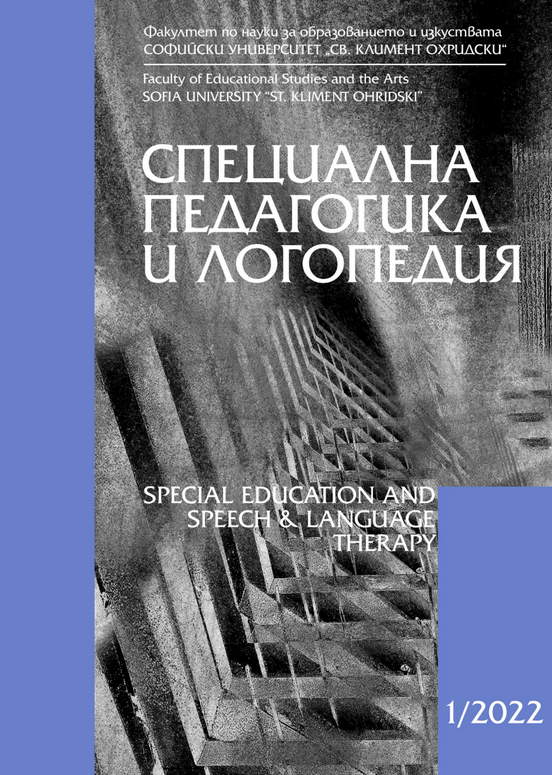Семейно-медиираната ранна интервенция – естествен комуникативен модел, подкрепящ взаимодействието дете – родител в ранното детство
DOI :
https://doi.org/10.60059/SPL.2022.1.16-30Ключови думи :
семейно-медиирана ранна интервенция, естествена комуникация, изследване, ранна възрастАбстракт
Резюме: Семейно-медиираната ранна интервенция (СМРИ) е естествен комуникативен модел и е ефективна при справяне с предизвикателства на децата със затруднения във функционалната комуникация и адаптивните умения, помага за повишаване на компетентността на родителите в подкрепа на социалните взаимодействия родител – дете. В статията се представя изследване от 2019 г., проведено във Варна, България, с участието на 40 родители и 40 деца, което проучва връзката между използването на услугата СМРИ, родителския капацитет, социалното функциониране и адаптивните умения на децата. Резултатите показват значителен напредък при 2 – 3-годишни деца. Изследването подкрепя ефективността и значимостта на СМРИ за родителите и техните деца.
Библиография:
Able-Boone, H. (1996). Ethics and early intervention: Toward more relationship focused interventions. Infants and Young Children, 9 (2), 13 - 21.
Almirall, D., DiStefano, C., Chang, Y. C., Shire, S., Kaiser, A., Lu, X., et al. (2016) Preschool deployment of evidence–based social communication intervention: JASPER in the classroom, Journal of Autism and Developmental Disorders, 46(6), 2211–2223.
Baxendale J. & Hesketh. A (2003) Comparison of the effectiveness of the Hanen Parent Programme and traditional clinic therapy, International Journal of Language & Communication Disorders. 38 (4), 397-415.
Fiese, B. H. (1992). Dimensions of family rituals across two generations: Relation to adolescent identity, Family Process, 31, 151–162.
Goods, K. , Ishijimma, E., Chang, Ya., Kasari, C. Preschool based JASPER intervention in minimally verbal children with autism: Pilot RCT. Journal of Autism and Developmental Disabilities, 43, 1050–1056.
Hancock, T. B., & Kaiser, A. P. (2006). Enhanced Milieu Teaching. In R. McCauley & M. Fey (Eds.), Treatment of Language Disorders in Children, pp. 203-233. Baltimore: Paul Brookes.
Hoff, E. (2006). How social contexts support and shape language development. Developmental Review, 26 (1): 55-88.
Kaale, A., Fagerland, M. W., Martinsen, E. W., & Smith, L. (2014) Preschool-based social communication treatment for children with autism: 12-month follow-up of a randomized trial. https://pubmed.ncbi.nlm.nih.gov/24472253/.
Kaiser A. (2011). KidTalk: Naturalistic Communication Intervention Strategies for Parents and Teachers of Young Children.
Kaiser, A., & Roberts, M. (2013). Parent-implemented enhanced milieu teaching with preschool children with intellectual disabilities. Journal of Speech, Language, and Hearing Research, 56, 295–309.
Kochanska, G, Forman, D. & Coy, K. (1999). Implications of the mother-child relationship in infancy for socialization in the second year of life. Infant Behavior and Development, 22 (2), 249-265. https://doi.org/10.1016/S0163-6383(99)00009-0.
Landry, S. H., Smith, K. E., Miller-Loncar, C. L., & Swank, P. R. (1997). Predicting cognitive-linguistic and social growth curves from early maternal behaviors in children at varying degrees of biologic risk. Developmental Psychology, 33, 1040–1053.
Landry, S. H., Denson, S., & Swank, P. R (1997). Effects of medical risk and socioeconomic status on the rate of change in cognitive and social development for low birth weight children. Journal of Experimental and Clinical Neuropsychology, 19, 261–274.
Lucyshyn, J. M., Irvin, L. K., Blumberg, E. R., Laverty, R., Horner, R. H., & Sprague, J. R. (2004). Validating the construct of coercion in family routines: Expanding the unit of analysis in behavioral assessment in families of children with developmental disabilities. Research and Practice for Persons with Severe Disabilities, 29, 104–121.
Martini, M. (2002). How mothers in four American cultural groups shape infant learning during mealtimes. Zero to Three, 22(4), 14–20.
Moore, H.W., Barton, E.B., & Chironis, M. (2014). A program for improving toddler communication through parent coaching. Topics in Early Childhood Special Education, 33, 212-224.
Roberts, M. & Kaiser, A. (2011) The effectiveness of parent-implemented language interventions: a meta-analysis. Am J Speech Lang Pathol, 20(3):180-99. Epub 2011 Apr 8. https://pubmed.ncbi.nlm.nih.gov/21478280/.
Waddington. H, Reynolds J. et all. (2021). The effects of JASPER intervention for children with autism spectrum disorder: A systematic review. Autism: the international journal of research and practice, 2021, Vol.25 (8), p.2370-2385. Research gate.
Weisner, T. S. (2002). Ecocultural understanding of children’s developmental pathways. Human Development, 45, 275–281.
Zimmerman F. J., Glilkerson, J., Richards. J., Christakis., D., Gray, Sh. (2009). Teaching by Listening: The Importance of Adult-Child Conversations to language development. Pediatrics, 124 (1):342-9.


